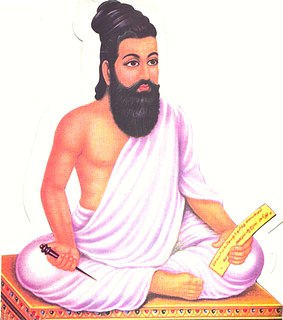A Quote by Chanakya
A man or a ruler should always take up a task after thoroughly considering its consequences. Otherwise fate also cannot protect his wealth.
Related Quotes
One of man's important mistakes, one which must be remembered, is his illusion in regard to his I. Man such as we know him, the 'man-machine,' the man who cannot 'do,' and with whom and through whom everything 'happens,' cannot have a permanent and single I. His I changes as quickly as his thoughts, feelings and moods, and he makes a profound mistake in considering himself always one and the same person; in reality he is always a different person, not the one he was a moment ago.
A tolerant person should not be harrased. The subject or the ruled ones generally is loyal to the ruler. The people tak to revolt when they are helpless. The duty of the ruler is that his humble people mey not tak to revolt being suppressed by his bad polity. Considering the forbearance of the subject, do not ill behave with them so that they may feel oppressed.
A man must know his destiny… if he does not recognize it, then he is lost. By this I mean, once, twice, or at the very most, three times, fate will reach out and tap a man on the shoulder… if he has the imagination, he will turn around and fate will point out to him what fork in the road he should take, if he has the guts, he will take it.
When people buy, rescue, or otherwise acquire a dog from unscrupulous breeders or amateur rescue groups, they are making a decision with ethical consequences. They have a profound responsibility to consider their actions; to gauge the dog's behavior, to train it thoroughly and rigorously, to protect other humans and dogs from harm.
More and more it seems to me that the philosopher, being of necessity a man of tomorrow and the day after tomorrow, has always found himself, and had to find himself, in contradiction to his today: his enemy was ever the ideal of today. So far all these extraordinary furtherers of men whom one calls philosophers, though they themselves have rarely felt like friends of wisdom but rather like disagreeable fools and dangerous question marks, have found their task, their hard, unwanted, inescapable task, but eventually also the greatness of their task, in being the bad conscience of their time.
If a man stopped me in the street and demanded of me my watch, I should refuse to give it to him. If he threatened to take it by force, I feel I should, though not a fighting man, do my best to protect it. If, on the other hand, he should assert his intention of trying to obtain it by means of an action in any court of law, I should take it out of my pocket and hand it to him, and think I had got off cheaply.
Every time man makes a new experiment he always learns more. He cannot learn less. He may learn that what he thought was true was not true. By the elimination of a false premise, his basic capital wealth which in his given lifetime is disembarrassed of further preoccupation with considerations of how to employ a worthless time-consuming hypothesis. Freeing his time for its more effective exploratory investment is to give man increased wealth.

































